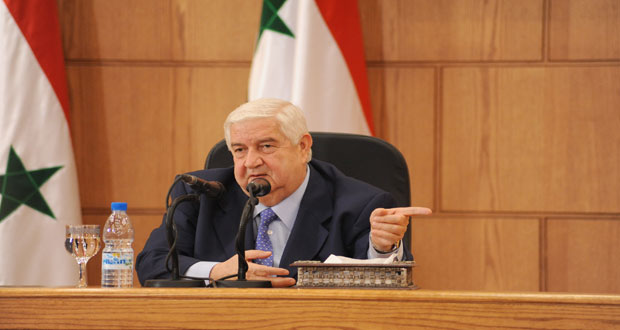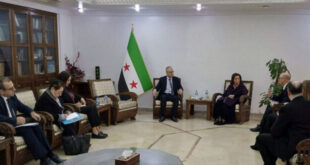Cairo, SANA – Deputy Premier, Foreign and Expatriates Minister Walid al-Moallem stressed on Thursday that Syria welcomes any Arab initiative aimed at solving the crisis in the country.
“We open our hands to every Arab initiative. We say hello to those who knock on our door as we seek to stop the bloodshed,” said al-Moallem in an interview with the Egyptian al-Nahar TV channel.
Asked about Syria’s relations with Iran and the Lebanese Hezbollah Resistance Movement, he said “some are worried about our relationship with Iran and Hezbollah because of our unified stance towards Israel.”
He described Syria’s relations with Iran, Russia and China as ones of mutual respect, adding however that it was the Arabs who quit their role towards Syria.
Al-Moallem slammed the silence, in some cases, and conspiratorial role, in others, of most of the Arabs in relation to Syria “at a time when Iran rushed for our help.”
Answering a question about the deterioration of Syria’s relations with Egypt and Saudi Arabia in particular, al-Moallem said this question should be directed to the Egyptian and Saudi sides because it was them who walked out on Syria, whereas Syria has always been defending the Arab issues.
He, however, hailed “Egypt’s revolutions” and the toppling of the Muslim Brotherhood and confronting the terrorism of the Islamic State in Iraq and Syria (ISIS) in Sinai.
As for the Syrian-Turkish dispute, al-Moallem said the reason behind this dispute was triggered in 2011 when the Syrian leadership rejected a request by Ankara to allow the Muslim Brotherhood be part of the power.
“we said ‘no’ because the Muslim Brotherhood is a terrorist organization and it has been so since 1980,” he added.
He dismissed the so-called “Arab Spring” in the region, saying it serves Israel’s interests. “We are destroying each other and Israel applauds.”
Al-Moallem called for implementing the UN Security Council’s counterterrorism resolutions and for obliging the countries which support the terrorist organizations to stop financing and arming them in order for a political solution to the crisis in Syria to be reached.
The solution to the crisis, he said, needs great efforts, expressing optimism over Iran’s role in reaching a solution, adding that Egypt can do the same if it was to play its role.
He made it clear that it is natural that the Syrian state uses the appropriate tools in fighting terrorism, noting that “as long as the Syrian Army is determined, firm and ready to make sacrifices, this is a cause for optimism.”
Al-Moallem: De Mistura’ plan aims at buying time, conspirators are in critical situation
Later, al-Moallem gave another interview to the Egyptian al-Akhbar newspaper in which he said the UN Security Council’s presidential statement adopting UN Special Envoy Staffan de Mistura’ plan to solve the crisis in Syria through forming four committees to discuss a number of issues aims at “buying time till October”, when Iran’s nuclear deal is to be or not be approved.
“De Mistura thinks if the U.S. administration would get the Congress’s approval of the nuclear deal with Iran, that would give Iran momentum to take part in solving the crises in the region,” said al-Moallem.
Al-Moallem criticized De Mistura for turning his position from a “a neutral UN envoy” into a source of statements that are based on propaganda and false information, dismissing de Mistura’s silence on the shelling attacks against the cities of Damascus, Aleppo and Lattakia and the cutting off of water in Aleppo by the terrorists.
Asked whether there are secret contacts between Washington and Damascus, al-Moallem said “There are no contacts with Washington, and we don’t work under the table.
“Whoever wants to talk with us and has the courage to do that, let it be in public because we have nothing to hide or be afraid of.”
Al-Moallem reiterated affirmation that establishing a so-called “safe zone” in northern Syria would be a transgression against Syria’s national sovereignty and “a cheap exploitation by the Turkish regime of the security situation in Syria.”
Al-Moallem was asked by the newspaper about a Turkish officer’s visit to Damascus, and to which he answered that a former Turkish officer affiliated to a Turkish opposition party that did not win a vote share in the elections came to Damascus and said he was commissioned to discuss coordination between the Syrian and Turkish armies in fighting ISIS.
“Nevertheless, we are pretty sure that the ruling party in Turkey- the Justice and Development Party- would not fight ISIS for ideological reasons,” he added.
Al-Moallem told the Egyptian newspaper that “our analyses indicate that the conspirators against Syria are in critical situation,” citing the failure of the US-led international coalition against ISIS, operating for over a year now, to achieve results on the ground, which he said led to having voices raising in the US demanding that Washington cooperate with the Syrian government in the fight against ISIS.
Al-Moallem reiterated what he said yesterday in an interview with a Lebanese newspaper that Iran has no full-fledged initiative so far on solving the crisis in Syria, but rather a set of ideas that were presented by its Foreign Minister on his latest visit to Damascus.
Once these ideas are crystallized, he added, the Iranian side will work to sell them, affirming that any sectarian-based talk would find no ground in Syria.
Al-Moallem renewed that the Syrian government is ready for dialogue with any Syrian opposition figure that believes in Syria’s unity and sovereignty and condemns terrorism.
“The solution is clear, and is based on a golden ground, that of the Syrian people being the ones to decide their destiny and choose by whom they are to be governed,” he said, promising commitment to any solution that is the result of an inter-Syrian dialogue.
Al-Moallem expressed hope that Egypt will re-assume its historic role, the one that befits its weight, mildly reproving the Egyptian Foreign Ministry for holding meetings for a group “calling itself Syrian opposition” in Cairo without consultation or coordination with the Syrian government.
While providing no information whether a high-ranking Egyptian envoy has visited Damascus, al-Moallem said this “doesn’t mean that there is no security cooperation that could pave the way for normalizing the relations between the two countries.”
English Bulletin
 Syrian Arab News Agency S A N A
Syrian Arab News Agency S A N A




